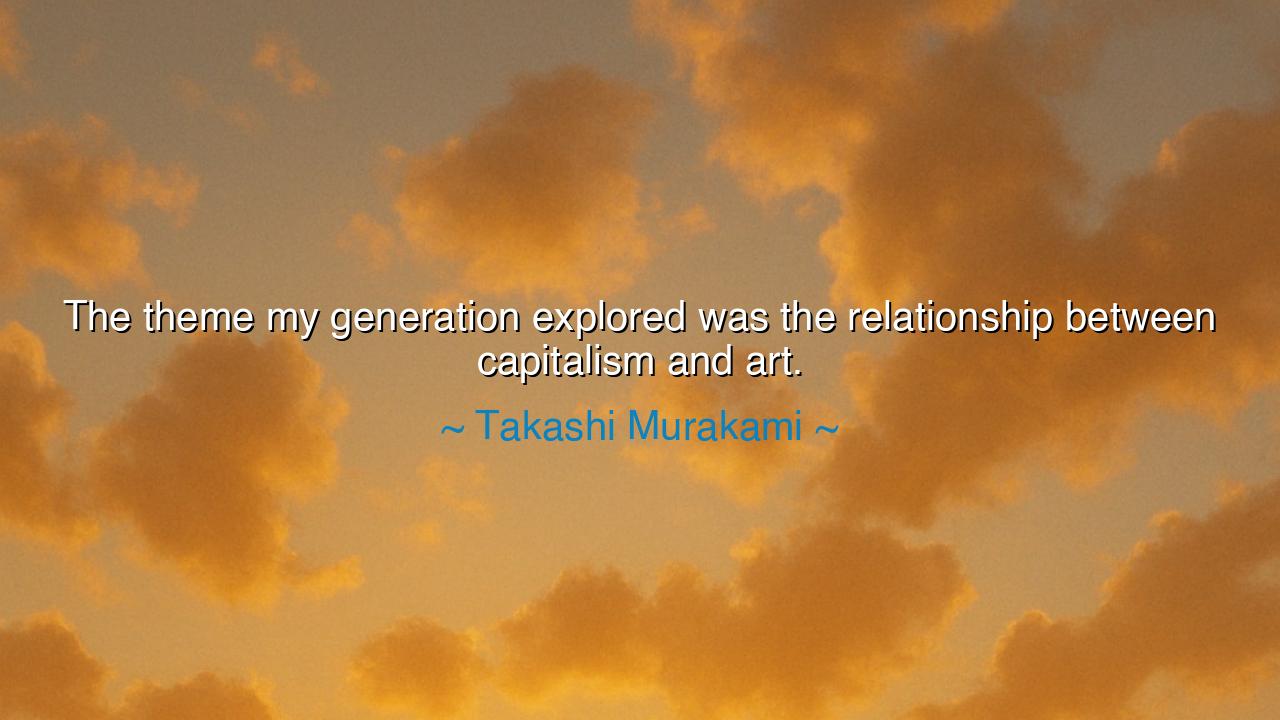
The theme my generation explored was the relationship between






The words of Takashi Murakami—“The theme my generation explored was the relationship between capitalism and art”—speak as the testimony of an age, a declaration that every era must wrestle with its own trials and questions. They remind us that art is never separate from the world that surrounds it, and that in Murakami’s time, the challenge was to reconcile the purity of creation with the consuming force of capitalism.
The ancients too knew this struggle, though by other names. The poets of Greece sang under the patronage of kings; Roman sculptors carved their works for emperors and temples; even the troubadours of the Middle Ages served courts and lords. Always the question remained: does art serve wealth, or does it transcend it? Murakami’s generation, like those before, stood at this crossroads, but in an age where markets grew global and commerce reached every corner of life.
To explore the relationship between capitalism and art is to ask: can beauty survive when it is bound to profit? Can creativity flourish when it must bend to demand? Murakami’s answer, through his work, was not to reject but to transform—to embrace the symbols of commerce, the colors of popular culture, and to elevate them into high art. Thus, his generation sought not escape from capitalism, but a reimagining of it, turning market forces into both subject and medium.
This is a heroic act, for it takes courage to face the world as it is and to create within it, rather than to flee into the safety of the past. To weave together art and capitalism without losing the soul of creation requires balance, vision, and defiance. The ancients would have called this the path of the wise craftsman, who takes the materials at hand—stone, clay, coin, or symbol—and shapes them into something that endures beyond their origin.
So let this teaching endure: every generation must define its theme, and every age must ask what art means within its own order. Murakami and his peers declared that beauty could exist even in the marketplace, that imagination could thrive even amidst the machinery of capitalism. And from their struggle we inherit the wisdom that true art is not destroyed by its bonds, but often reshapes those very bonds into a new language of truth and wonder.






NNPham Ngoc Nhi
Murakami’s statement about capitalism and art makes me reflect on how art today is often seen as a financial asset. Many artists are required to navigate the commercial side of their work, and it can be hard to tell where the artist’s personal voice ends and the market’s demand begins. Can art ever be free from the influence of capitalism, or is it an inevitable part of how art functions in today’s world?
TANguyen Thao Anh
Murakami’s quote raises important questions about the intersection of capitalism and creativity. Art has always been influenced by money, but today it feels like the market can often overshadow the creative process itself. How do artists navigate this balance? Can art still be a vehicle for social change or personal expression when it’s so wrapped up in the business of capitalism? What role does art play in challenging or reinforcing capitalist structures?
NNgoc
I find it fascinating that Murakami highlights capitalism’s influence on art. This relationship can be seen everywhere in modern art, where market value often dictates an artist’s success. But how does this affect the creativity behind the work? Are artists today more focused on making art that will sell, or are they still driven by personal expression and cultural commentary? How do we balance commercial success with artistic integrity?
GKBach Gia Ky
Murakami’s focus on the relationship between capitalism and art is an insightful commentary on the current state of the art world. It makes me question whether true creativity can exist in a system where art is commodified and sold for profit. Is it possible for artists to stay true to their vision while also participating in a market that demands profitability? Or does the very act of selling art alter its authenticity?
NMhung nguyen music
Takashi Murakami’s reflection on his generation’s exploration of capitalism and art really struck me. The tension between commerce and creativity is something that’s often discussed in the art world. How much of art today is influenced by commercial interests rather than pure creative expression? Is it possible for art to remain authentic when it’s so closely tied to the capitalist system that drives the market?